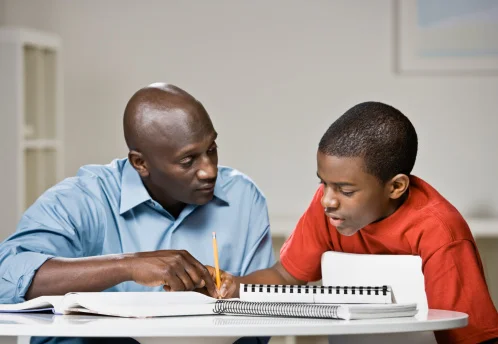+1 845 259 2974 (11 a.m to 7 p.m CST)
How to Help Your Teen Overcome Test Anxiety

Watching a teenager crumble under the weight of exam pressure is one of the most gut-wrenching things a parent can witness. It is not merely about a bad grade on a maths paper. It is about seeing a bright, funny young person transform into a ball of nerves. The pacing, the snapping, the vacant stares at a textbook for an hour without a page turning, or worse, the complete shutdown. The light in their eyes goes out, replaced by a flat, panicked dread.
That feeling of helplessness is profound. The instinct is to wrap them in a hug and proclaim that none of it matters, but in their world, it matters more than anything. The entire future seems to hinge on one set of GCSEs or A-Levels. The system shouts that these results are the ultimate decider of destiny, and teenagers are listening.
For any parent sitting there, feeling that familiar knot of parental worry, this is a heartfelt, from-the-trenches look at what can be done to help teenagers not just survive exam season, but to walk into that exam hall feeling capable and prepared.
First, Understand the Beast: It's Not Laziness, It's Terror
Before addressing the problem, it is crucial to understand what is happening inside a teenager's head. Procrastination on TikTok for the third hour running is easily labelled as laziness. But often, it is pure, unadulterated avoidance.
Test anxiety is a primal response. The brain perceives the exam as a genuine threat—a tiger in the room. This triggers the fight, flight, or freeze response. The "fight" might look like irritability and anger. The "flight" is the procrastination, the finding of any excuse to be anywhere but at that desk. The "freeze" is the classic "brain freeze" in the exam itself, where all the revision just… vanishes.
Therefore, the first step is a massive shift in perspective. The behaviour must be seen not as a choice, but as a symptom. This alone changes the dynamic from a battle of wills to a partnership against a common enemy.
Building the Foundation: The Parent's Role as the Anchor
A teenager might act like they want everyone a million miles away, but a steady parental presence is their anchor in the storm. It is not about having all the answers; it is about how one shows up.
1. Listen, Don't Fix.
The instinct is often to problem-solve. "Have you made a revision timetable?" "Why don’t you try re-writing your notes?" "Let me test you." A teenager will start talking about feeling overwhelmed, and within seconds, solutions are offered. All they hear is, "You’re not doing it right."
Instead, try just being a sounding board. Let them vent without interruption. Using phrases like:
"That sounds incredibly tough."
"It makes complete sense that you’re feeling so stressed."
"I’m just here to listen."
This is not about agreeing that the world is ending; it is about validating the feeling that it is. This validation is a powerful de-escalator. It tells them their emotions are legitimate and that they are safe to feel them.
2. Manage Personal Anxiety.
Teenagers are sponges for the emotional states of those around them. If a parent is pacing, wringing their hands, and asking every five minutes if they’ve done enough revision, it pours fuel on the fire. It is vital to do the personal work to calm personal nerves.
3. Normalise Failure (And Really Normalise It).
We live in a culture that worships success. But having honest, heartfelt conversations about setbacks is essential. Sharing stories from one’s own life where an exam was failed, a rejection was faced, and how it wasn’t the end of the world can be transformative. Maybe it even led somewhere better.
Practical Strategies: The Toolkit for Taming the Panic
Once the emotional foundation is solid, practical tools can be introduced. These are not magic wands, but they are like giving someone a torch in a dark room—they make the darkness manageable.
1. Taming the Physical Monster: Breathing and Grounding.
When the panic starts to rise, the body is the first to react. Hacking the body calms the mind.
- The 4-7-8 Breathing Technique: This is a game-changer. Breathe in through the nose for 4 seconds, hold the breath for 7 seconds, and exhale slowly through the mouth for 8 seconds. Doing this just three or four times physically slows the heart rate and tells the nervous system the "tiger" is gone. Practising it when calm makes it easier to access when panicking.
- The 5-4-3-2-1 Grounding Technique: This pulls the brain out of its internal panic and into the present moment. Find and name:
- 5 things they can see.
- 4 things they can feel (the chair under them, their socks on their feet).
- 3 things they can hear.
- 2 things they can smell.
- 1 thing they can taste.
It is a simple, incredibly effective way to short-circuit a panic attack.
2. Taming the Mental Monster: Reframing and Self-Talk.
The voice in their head is often a brutal critic. "You’re going to fail. You’re so stupid. Everyone else gets it, why don’t you?" Challenging that voice is essential.
- Name the Critic: Giving the negative voice a silly name helps. "Oh, that’s just ‘Gloomy Greg’ spouting nonsense again." It creates psychological distance, helping them see these thoughts as separate from their true self.
- Evidence Log: Keeping a simple log is effective. When the thought, "I’m terrible at Chemistry," arises, writing down three pieces of evidence to the contrary (e.g., "I understood that topic on bonding last week," "I got a 7 on that mini-test," "I helped my friend understand it") can be powerful. Facts are the enemy of distorted thinking.
The Home Environment: Creating a Sanitary Sanctuary
The home needs to be a pit-stop, not another part of the race track. The enviornment must be considered.
- The Fuel: Living on pizza and energy drinks during revision plays havoc with mood and energy. Hydration is crucial; even mild dehydration can mimic anxiety symptoms. A reusable water bottle on the desk is a simple but powerful tool.
- The Rhythm: Protecting sleep is non-negotiable. Screens are the enemy of sleep. Encouraging a wind-down routine an hour before bed—no phones, no revision—is beneficial. A bath, reading a book for fun, or listening to calm music can help. Sleep is when the brain consolidates memory.
- The Balance: Forcing breaks that involve movement and fun is essential. A walk, even if it’s just 15 minutes around the block, can help.
The Day of the Exam: Keeping the Ship Steady
The big day arrives. The tension is palpable. The parental role today is to be a calm, practical support system.
- A Normal Morning: As much as possible, sticking to the usual routine is best. A sudden, over-the-top "special" breakfast can heighten the sense of occasion and pressure.
- The "Duvet Day" Agreement: This is a powerful psychological trick. Agreeing that if the teenager truly feels they cannot go in, they can have a "duvet day" without argument can be powerful.
When It's More Than Just Nerves: Knowing When to Seek Help
For most teenagers, these strategies will make a significant difference. But for some, the anxiety is so severe and debilitating that it is more than just exam stress. It is a clinical issue.
Look out for:
- Panic attacks that are frequent and intense.
- Changes in eating or sleeping patterns that are extreme and prolonged.
- Complete social withdrawal.
- Talk of hopelessness or worthlessness
- Any mention of self-harm.
If these signs appear, it is time to seek professional help. This is not a failure on anyone's part. Talking to a GP is the first step. They can refer a child for counselling, such as Cognitive Behavioural Therapy (CBT), which is excellent for anxiety.
Also Read : How can parents fight against teens’ ‘I don’t have homework’?
The Long View: This Too Shall Pass
The results will come, and they will be fine. Good, even. But the most important result is not on that piece of paper. The most important result is what the teenager learned about themself. They learned that they are stronger than their anxiety. They learned that they can face something terrifying and come out the other side. They learned that their family is their safety net, no matter what.
That, in the end, is the ultimate goal. It is not about the A* or the 9. It is about helping them navigate one of life’s first big pressures with their spirit intact. It is about teaching them resilience, self-compassion, and the profound knowledge that their worth is immeasurable and untouchable by any exam board in the world.
So, take a deep breath. They have a calm harbour in the storm. Trust that they will learn to sail their own ship, even through the roughest of waters. It's a messy, emotional, and utterly human journey, but one that can be navigated together, one deep breath at a time.





















